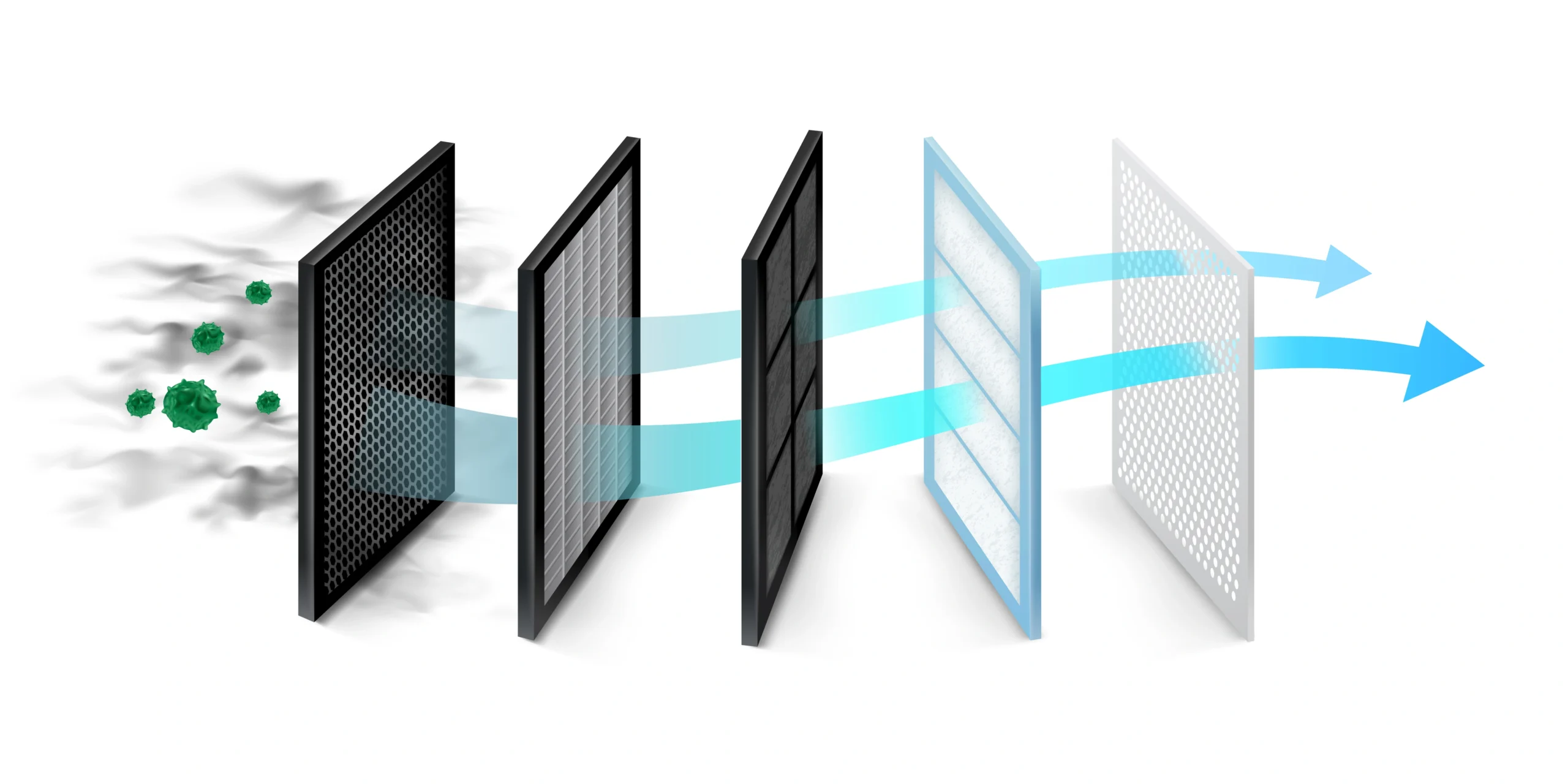As a homeowner, one of the simplest things you can do to keep clean air circulating through your home is to change the air filter. The filter traps dust particles, contaminants, and pollutants as the air passes through, purifying the air on the other side.
In a perfect world, the most effective air filter you could buy for your HVAC system would capture up to 99.9% of particles but allow the air to pass through without straining your HVAC’s blower or other moving parts.
If you’re wondering what the most effective type of air filter is, then read on. We discuss the importance of air conditioner filter replacements, discuss the best air filter ratings, and compare popular products.

Why Are Air Filters Important in Your HVAC System?
Construction and HVAC companies started using air filters in HVAC systems as early as the 1940s as a way to reduce dust and odors. The concept still stands today. Air filters play a central role in heating and cooling hygiene.
A filter performs five valuable functions:
- Improve indoor air quality
- Enhance system efficiency
- Prevent dust buildup in ducts
- Protect HVAC components
- Reduce energy consumption
These functions add up to a core HVAC component that keeps your air conditioner running smoothly with less dirt buildup, fewer repairs, and lower energy consumption. As a result, you save money in the long run.
As an added feature, a filter allows you to breathe cleaner air, which is always a good thing. If you have allergies, an air filter is an essential part of your heating and cooling system.
Minimum Efficiency Reporting Value: What Is MERV and Why Is It Important?
When comparing hvac filters, you need a measuring stick to determine which products do the best job of removing small particles from the air.
The measuring stick we’re referring to is known as the MERV rating.
MERV = Minimum Efficiency Reporting Value
The rating range is 1 to 20, with 1 being the lowest efficiency and 20 being the highest. For instance, a MERV rating of 1 suggests that a filter captures less than 20 percent of tiny particles. On the other hand, a MERV rating of 20 means that a filter captures 99.9+ percent of tiny particles.
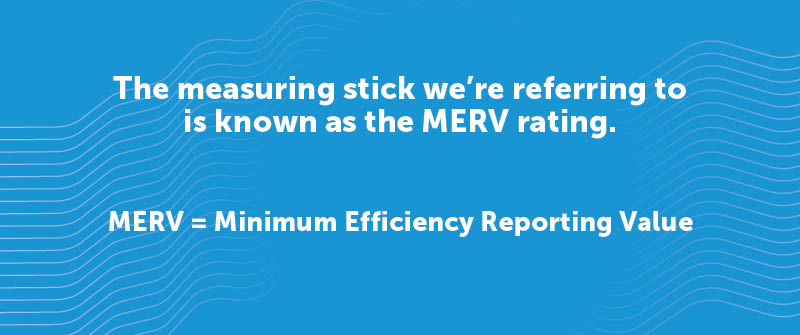
Look at the table below to compare six different MERV ratings to get a better idea of how the rating system works (keep in mind HEPA filters stand for High-Efficiency Particulate Air and refer to the air filter efficiency):
| MERV Rating | Particle Size | Efficiency | Common Uses | Effective Air Filter Types |
| 1-4 | > 10 microns | Low | Residential, window AC | Fiberglass, washable |
| 5-8 | 3-10 microns | Moderate | Residential, Commercial | Pleated, synthetic |
| 9-13 | 1-3 microns | High | Residential, hospitals, labs | Pleated, electrostatic |
| 14-16 | 0.3-1 microns | Very High | Surgical rooms, cleanrooms | HEPA, high-efficiency pleated |
| 17-20 | < 0.3 microns | Extremely High | Pharmaceutical manufacturing, cleanrooms | ULPA, advanced HEPA |
What MERV Is Best in an Air Filter?
The best MERV rating depends on what you’re using it for.
Now that you have an understanding of how the MERV rating works, you need to learn the best application for each rating or group of ratings. While filters with low ratings may not capture tiny particles, they are still ideal in certain settings. Filters with the highest ratings may do a better job of catching tiny particles but may not be good for your home.
Let’s take a closer look at different ratings to determine how best to use them. Note: We’re comparing 20x2x1 air filters:
| MERV Rating | Best Uses |
| 1-4 | Best for residential window air conditioners and basic HVAC systems, filtering larger particles like dust and pollen. |
| 5-8 | Ideal for residential and light commercial buildings, capturing common pollutants such as mold spores and pet dander. |
| 9-13 | Suitable for hospitals and superior residential filtration, effectively trapping lead dust and auto emissions. |
| 14-16 | Used in hospitals and cleanrooms, capturing bacteria and smoke particles for high air quality control. |
| 17-20 | Employed in pharmaceutical manufacturing and ultra-clean environments, removing extremely fine particles like viruses and carbon dust. |
What Is the Best 20x20x1 Air Filter for Allergies?
One of the most common air filter sizes in homes is 20x20x1 air filters. The size and dimensions are designed for durability, longevity, and capacity. It can capture a healthy amount of particles over a long period. The dimension also influences the MERV rating.
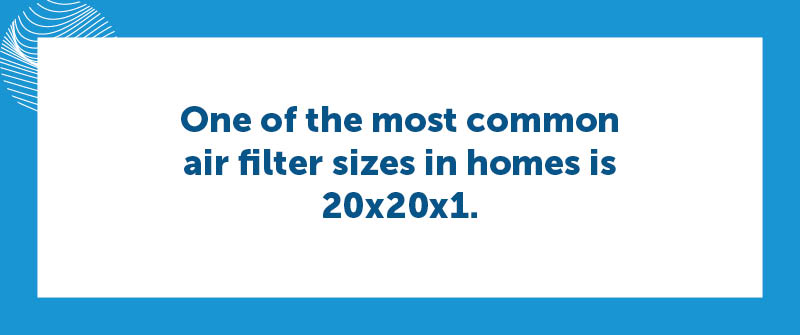
What makes the 20x20x1 air filter so popular? There are several reasons for this:
- A MERV 13 air filter captures tiny particles that irritate allergies: Merv 13 air filters traps 90 percent of pet dander, mold spores, dust, VOCs, and other airborne particles that cause mild to severe allergies.
- Most MERV 13 filters are pleated: The construction creates a larger area to capture more particles for a longer period.
- Most MERV 13 filters are disposable: If allergies are a factor, a disposable air filter may be a healthier option than one you can clean. You can replace your filter every three months.
- MERV 13 air filters allow smooth airflow: Your air filter needs to strike a balance between trapping particles and allowing a smooth airflow. It’s somewhere in the middle, so you get the best of both benefits.
Which Type of Air Filter Lasts the Longest?
The type of air filter that lasts the longest is the high-efficiency pleated filter. These filters use dense, pleated material that captures more particles over time compared to standard fiberglass or synthetic filters.
Let’s do a side-by-side comparison with other types of air filters.
| Air Filter Type | Construction | How Long It Lasts |
| Fiberglass Filters | Spun fiberglass, basic frame | 1 month |
| Pleated Filters | Pleated cotton or polyester fabric | 3 to 6 months |
| High-Efficiency Pleated Filters | Dense pleated material, high surface area | 6 to 12 months (not 1”) |
| Synthetic Filters | Synthetic fibers, often non-woven | 1 to 3 months |
Pleated filters have more surface area. So they can hold more dirt and debris through a 90-day period. They also improve the air quality in your home by trapping smaller particles like dust, pollen, and bacteria. This means fewer filter changes and better protection for your HVAC system, making it a smart investment for long-term health and comfort.
5 Factors That Affect Your Air Filter’s Lifespan
Your air filter and home have a reciprocal relationship—one impacts the other, but what are the best air filters for home? The best air filters in the world cannot compensate for a poor home environment or lack of care. Let’s take a look at five factors that affect how long your air filter will last.
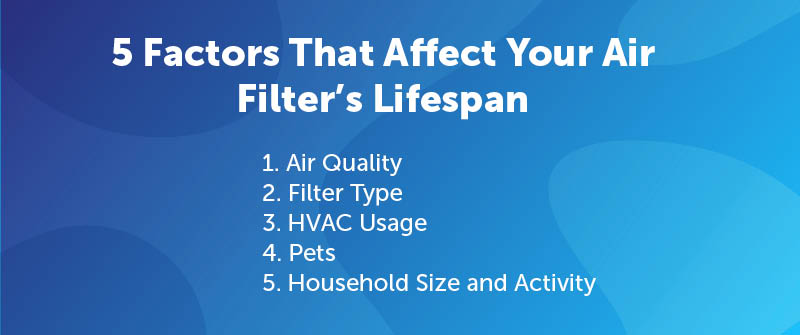
1. Air Quality
If your home is constantly filled with dust, pollen, VOCs, and other particles, it clogs up the filter (and your heating and cooling system) faster. Regular dusting can make a difference in how long the filter lasts.
2. Filter Type
As discussed above, the different filters have varying lifespans. Try to purchase an air filter with a minimum of three months of performance life.
3. HVAC Usage
Is your furnace, AC, or heat pump running around the clock? If so, it’s going to circulate air through the filter more. As a result, you may have to change it out more often.
4. Pets
Yes, your pet may be contributing to the air filter’s lifespan. Pet dander is larger than most microns and fills up the filter trap more, leading to a premature replacement.
5. Household Size and Activity
A larger home has more people. More people engage in more activities. More activity creates and stirs more dust, dirt, and contaminants.
Long-lasting air filters perform much better and have an extended lifespan when your home is cleaner and you buy the right filter for the right environment. With that in mind, here are some quick tips for maximizing your air filter’s lifespan:
- Clean or replace filters according to the manufacturer’s recommendations.
- Regularly vacuum and dust to reduce airborne particles.
- Prevent outside dust and pollutants from entering your home.
- Use air purifiers to reduce the load on your HVAC filter.
- Avoid smoking indoors and reduce the use of candles or fireplaces.
- Inspect your filters every month and change them as needed.
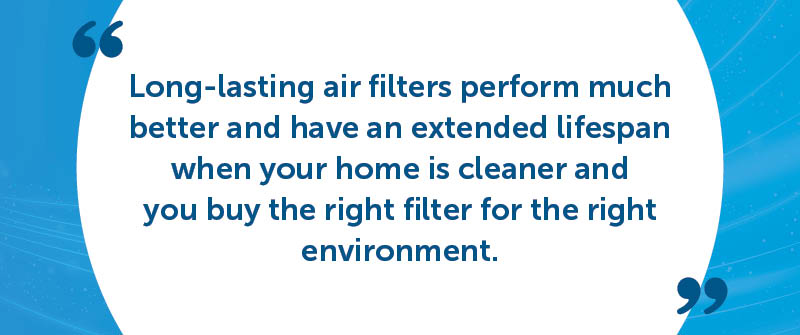
Which Filter Is Better, MERV 8 or MERV 11?
The MERV 8 and 11 ratings may not seem much different. However, there can be a leap when going from the 8 to 11 rating. Let’s look at a comparison between MERV 8 and MERV 11:
MERV 8 Air Filter
A MERV 8 filter is good for basic filtration needs. It captures dust, pollen, and lint, which helps keep your HVAC system running efficiently. If you don’t have severe allergies or pets, a MERV 8 filter can do the job and still be cost-effective.
Pros of MERV 8 Air Filter:
- Captures basic particles like dust and pollen
- Improves HVAC efficiency
- Widely available
- Easy to replace
- Lower cost
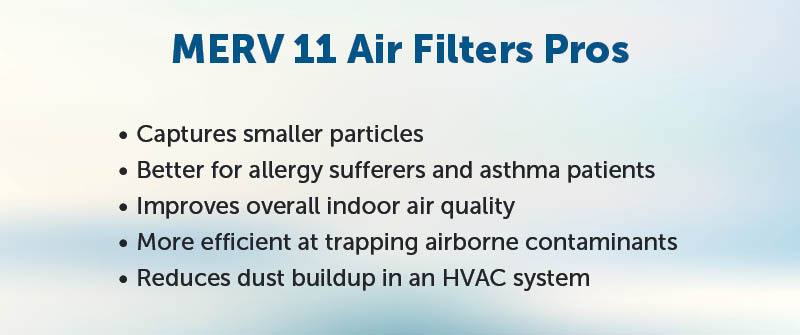
Cons of MERV 8 Air Filter:
- Doesn’t capture smaller particles
- Less effective for allergy sufferers
- May require more frequent replacements
- Lower overall filtration efficiency
- Not suitable for highly polluted environments
MERV 11 Air Filters
A MERV 11 filter is better than a MERV 8 filter if you want to capture smaller particles and improve your indoor air quality. MERV 11 filters can trap pet dander, mold spores, and bacteria. They’re ideal for homes with allergies or respiratory concerns.
Pros of MERV 11 Air Filters:
- Captures smaller particles such as pet dander and mold spores
- Better for allergy sufferers and asthma patients
- Improves overall indoor air quality
- More efficient at trapping airborne contaminants
- Reduces dust buildup in an HVAC system
Cons MERV 11 Air Filters:
- Higher cost compared to MERV 8 filters
- Can restrict airflow if not compatible with an HVAC system
- May require more frequent replacements in high-particle environments
- Slightly higher energy consumption
- Not necessary for homes without severe allergies or respiratory issues
How to Decide Which MERV Rating is Best for Your Home
Every home setting is unique, and every family has unique needs. For this reason, there is no one-size-fits-all air filter. Even the MERV ratings are dependent upon the home environment in which they are rating the filters. Therefore, there are several things you need to consider when comparing filters:
Your Indoor Air Quality Needs
If you and your family are healthy and you live in a normal environment, a MERV filter with a rating of 8 may suffice. However, if you have allergies or respiratory problems, you may want to consider a filter with a rating of 11 or 13.
Heating and Cooling Equipment
Most equipment, such as a furnace, central AC, or heat pump, requires a filter with a MERV rating of 8 to 13. This range balances efficient airflow with adequate filtration. Your system should operate efficiently while maintaining good indoor air quality.
Replacement Frequency
Overall, filters with a lower MERV rating have a higher replacement rate. The sweet spot is a MERV rating of 8 to 13. On average, you’ll replace these filters every 90 days, which is the norm.
Energy Efficiency
Energy efficiency is a difficult balance. Low-MERV filters allow more particles to infiltrate the HVAC system, leading to a dirtier, less efficient system. However, high-efficiency filters (HEPA), restrict airflow, making your system work harder—once again, less efficient. MERV filters between 8 and 13 generally strike a healthy balance.
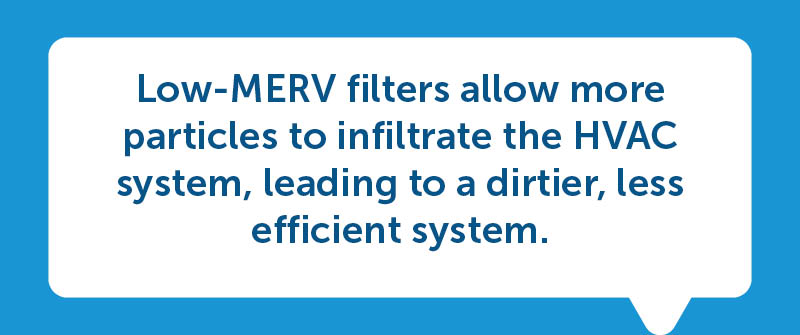
How Discount Filters Can Help
Whether you know exactly what kind of filter you are looking for or need guidance along the way, Discount Filters can help. With a wide range of products and years of industry experience, we can help you find solutions to meet your needs and your budget. Contact us today to get what you need.

